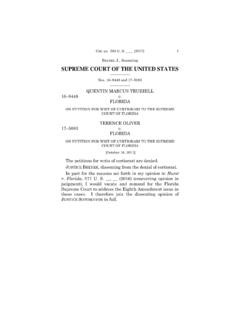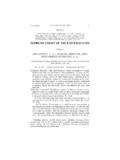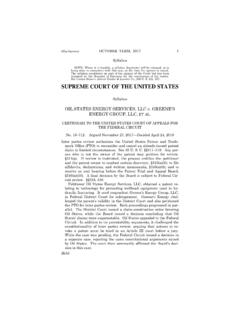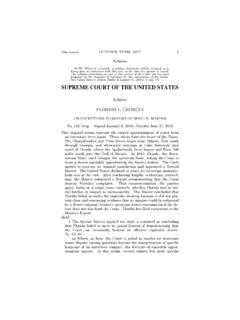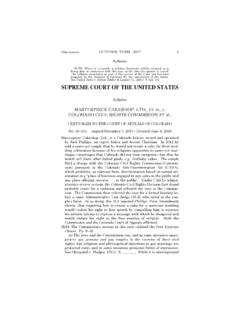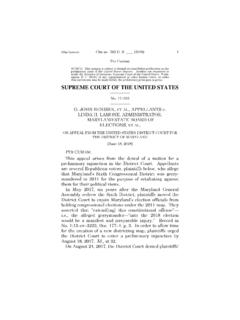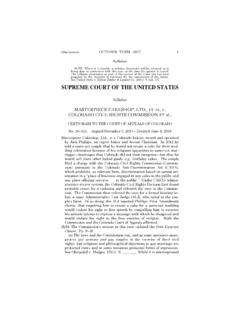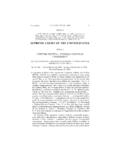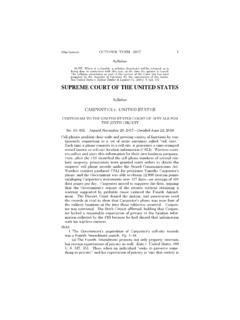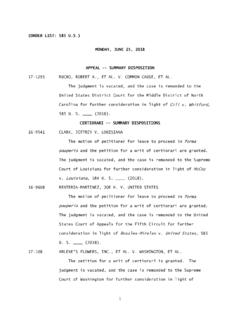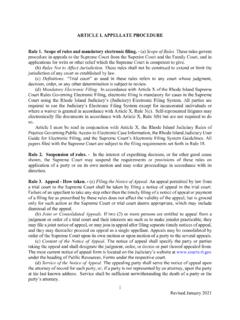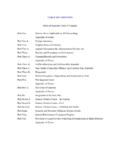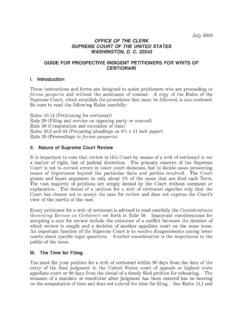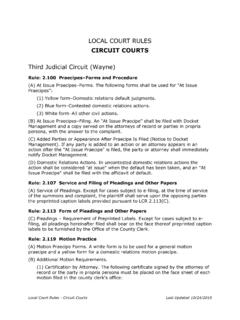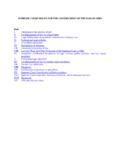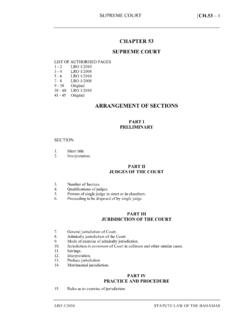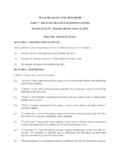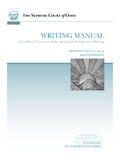Transcription of SUPREME COURT OF THE UNITED STATES
1 1 (Slip Opinion) OCTOBER TERM, 2020 Syllabus NOTE: Where it is feasible, a syllabus (headnote) will be released, as is being done in connection with this case, at the time the opinion is issued. The syllabus constitutes no part of the opinion of the COURT but has been prepared by the Reporter of Decisions for the convenience of the reader. See UNITED STATES v. Detroit Timber & Lumber Co., 200 U. S. 321, 337. SUPREME COURT OF THE UNITED STATES Syllabus MAHANOY AREA SCHOOL DISTRICT v. B. L., A MINOR, BY AND THROUGH HER FATHER, LEVY, ET AL. CERTIORARI TO THE UNITED STATES COURT OF APPEALS FOR THE THIRD CIRCUIT No. 20 255. Argued April 28, 2021 Decided June 23, 2021 Mahanoy Area High School student B. L. failed to make the school s var-sity cheerleading squad.
2 While visiting a local convenience store over the weekend, B. L. posted two images on Snapchat, a social media ap-plication for smartphones that allows users to share temporary images with selected friends. B. L. s posts expressed frustration with the school and the school s cheerleading squad, and one contained vulgar language and gestures. When school officials learned of the posts, theysuspended B. L. from the junior varsity cheerleading squad for the up-coming year. After unsuccessfully seeking to reverse that punishment, B. L. and her parents sought relief in federal COURT , arguing inter alia that punishing B. L. for her speech violated the First Amendment. The District COURT granted an injunction ordering the school to reinstateB. L. to the cheerleading team.
3 Relying on Tinker v. Des Moines Inde-pendent Community School Dist., 393 U. S. 503, to grant B. L. s subse-quent motion for summary judgment, the District COURT found that B. L. s punishment violated the First Amendment because her Snap-chat posts had not caused substantial disruption at the school. The Third Circuit affirmed the judgment, but the panel majority reasonedthat Tinker did not apply because schools had no special license to reg-ulate student speech occurring off campus. Held: While public schools may have a special interest in regulatingsome off-campus student speech, the special interests offered by the school are not sufficient to overcome B. L. s interest in free expression in this case. Pp. 4 11.(a) In Tinker, we indicated that schools have a special interest inregulating on-campus student speech that materially disrupts class- 2 MAHANOY AREA SCHOOL DIST.
4 V. B. L. Syllabus work or involves substantial disorder or invasion of the rights of oth-ers. 393 U. S., at 513. The special characteristics that give schools additional license to regulate student speech do not always disappearwhen that speech takes place off campus. Circumstances that mayimplicate a school s regulatory interests include serious or severe bul-lying or harassment targeting particular individuals; threats aimed atteachers or other students; the failure to follow rules concerning les-sons, the writing of papers, the use of computers, or participation inother online school activities; and breaches of school security devices. Pp. 4 6.(b) But three features of off-campus speech often, even if not always,distinguish schools efforts to regulate off-campus speech.
5 First, a school will rarely stand in loco parentis when a student speaks off cam-pus. Second, from the student speaker s perspective, regulations of off-campus speech, when coupled with regulations of on-campus speech, include all the speech a student utters during the full 24-hour means courts must be more skeptical of a school s efforts to regu-late off-campus speech, for doing so may mean the student cannot en-gage in that kind of speech at all. Third, the school itself has an inter-est in protecting a student s unpopular expression, especially when the expression takes place off campus, because America s public schools are the nurseries of democracy. Taken together, these three features of much off-campus speech mean that the leeway the First Amendmentgrants to schools in light of their special characteristics is 6 8.
6 (c) The school violated B. L. s First Amendment rights when it sus-pended her from the junior varsity cheerleading squad. Pp. 8 11.(1) B. L. s posts are entitled to First Amendment protection. The statements made in B. L. s Snapchats reflect criticism of the rules of a community of which B. L. forms a part. And B. L. s message did not involve features that would place it outside the First Amendment s or-dinary protection. Pp. 8 9.(2) The circumstances of B. L. s speech diminish the school s inter-est in regulation. B. L. s posts appeared outside of school hours from a location outside the school. She did not identify the school in her posts or target any member of the school community with vulgar or abusive language. B. L. also transmitted her speech through a per-sonal cellphone, to an audience consisting of her private circle of Snap-chat friends.
7 P. 9. (3) The school s interest in teaching good manners and conse-quently in punishing the use of vulgar language aimed at part of the school community is weakened considerably by the fact that B. L. spoke outside the school on her own time. B. L. spoke under circum- stances where the school did not stand in loco parentis. And the vul-garity in B. L. s posts encompassed a message of criticism. In addition, the school has presented no evidence of any general effort to prevent students from using vulgarity outside the classroom. Pp. 9 10. (4) The school s interest in preventing disruption is not supportedby the record, which shows that discussion of the matter took, at most,5 to 10 minutes of an Algebra class for just a couple of days and thatsome members of the cheerleading team were upset about the con-tent of B.
8 L. s Snapchats. App. 82 83. This alone does not satisfy Tinker s demanding standards. Pp. 10 11.(5) Likewise, there is little to suggest a substantial interferencein, or disruption of, the school s efforts to maintain cohesion on theschool cheerleading squad. P. 11. 964 F. 3d 170, affirmed. BREYER, J., delivered the opinion of the COURT , in which ROBERTS, C. J., and ALITO, SOTOMAYOR, KAGAN, GORSUCH, KAVANAUGH and BARRETT, JJ., joined. ALITO, J., filed a concurring opinion, in which GORSUCH, J., joined. THOMAS, J., filed a dissenting opinion. Cite as: 594 U. S. ____ (2021) Syllabus 3 _____ _____ 1 Cite as: 594 U. S. ____ (2021) Opinion of the COURT NOTICE: This opinion is subject to formal revision before publication in the preliminary print of the UNITED STATES Reports.
9 Readers are requested to notify the Reporter of Decisions, SUPREME COURT of the UNITED STATES , Wash-ington, D. C. 20543, of any typographical or other formal errors, in order that corrections may be made before the preliminary print goes to press. SUPREME COURT OF THE UNITED STATES No. 20 255 MAHANOY AREA SCHOOL DISTRICT, PETITIONER v. B. L., A MINOR, BY AND THROUGH HER FATHER, LAWRENCE LEVY AND HER MOTHER, BETTY LOU LEVY ON WRIT OF CERTIORARI TO THE UNITED STATES COURT OF APPEALS FOR THE THIRD CIRCUIT [June 23, 2021] JUSTICE BREYER delivered the opinion of the COURT . A public high school student used, and transmitted to herSnapchat friends, vulgar language and gestures criticizing both the school and the school s cheerleading team. The student s speech took place outside of school hours and away from the school s campus.
10 In response, the school sus-pended the student for a year from the cheerleading team. We must decide whether the COURT of Appeals for the ThirdCircuit correctly held that the school s decision violated the First Amendment. Although we do not agree with the rea-soning of the Third Circuit panel s majority, we do agree with its conclusion that the school s disciplinary action vio-lated the First Amendment. I A B. L. (who, together with her parents, is a respondent inthis case) was a student at Mahanoy Area High School, apublic school in Mahanoy City, Pennsylvania. At the end of her freshman year, B. L. tried out for a position on the 2 MAHANOY AREA SCHOOL DIST. v. B. L. Opinion of the COURT school s varsity cheerleading squad and for right fielder on a private softball team.
